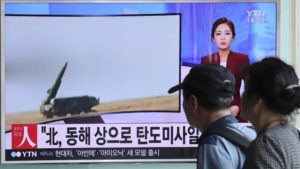
Voice of America:
North Korea has spent close to $100 million on more than 30 missile tests since Kim Jong Un assumed power in 2011, nearly double the number of missiles launched in the previous 18 years when his father Kim Jong Il ruled the country.
The South Korean newspaper the Chosun Ilbo estimated the cost of North Korea’s missiles based in part on what it said were the prices Middle Eastern countries had paid for these weapons.
Over the past two decades North Korea has reportedly sold hundreds of missiles, materials, and technology to Egypt, Iran, Libya, Pakistan, Syria, the United Arab Emirates, and Yemen.
Sanctions failure
That North Korea is able to carry out numerous missile tests raises questions about the effectiveness of harsh United Nations sanctions imposed in March that include a total arms embargo and restrictions on the sale of aviation fuel, which is also used to power rockets.
Boo Hyeong-wook, the chief of the Defense Strategy Research Division at the Korea Institute for Defense Analysis, said Pyongyang is acquiring missile replacement parts through lax sanctions enforcement and the help of willing international partners.
“As Indian media reported in June, Pakistan had been providing various parts necessary for WMDs (weapons of mass destruction) to North Korea through China. So in this situation I suspect that China has not strengthened its sanctions on parts that North Korea are trying to obtain,” he said.
Rodong or Scud missiles generally use kerosene-based fuel and not restricted aviation fuel. North Korea is using stored fuel reserves for the recent missile tests, Boo said, which may be part of the reason why fuel costs in the country have not increased since the sanctions were imposed.
G-20 message
The estimated cost of the three Rodong missiles that North Korea launched on Monday is between $3 million and $6 million.
The North’s medium range ballistic missiles traveled 1,000 kilometers before landing into Japan’s air defense identification zone. The launches were subsequently denounced by Tokyo, Seoul and Washington as yet another violation of United Nations Security Council resolutions.
The Security Council will meet Tuesday to discuss the latest missile launches by North Korea at the request of the United States and Japan.
There was no indication that Monday’s launches were conducted to assess new technical improvements or capabilities, as was the purpose of some recent tests.
Instead, analysts say, the Kim Jong Un government wanted to undermine any discussions on regional security that may have taken place at the G-20 summit of the world’s largest economies, that took place in China and included leaders from the U.S., South Korea, Japan and Russia.
